Environmental Sustainability in the Hospitality Industry
VerifiedAdded on 2023/04/10
|10
|3100
|375
AI Summary
This article discusses the importance of sustainable water management in the hospitality industry and its impact on environmental sustainability. It explores the challenges faced by firms in achieving sustainability and provides measures to attain sustainable water management. The article focuses on the Taj Group of Hotels as a case study.
Contribute Materials
Your contribution can guide someone’s learning journey. Share your
documents today.
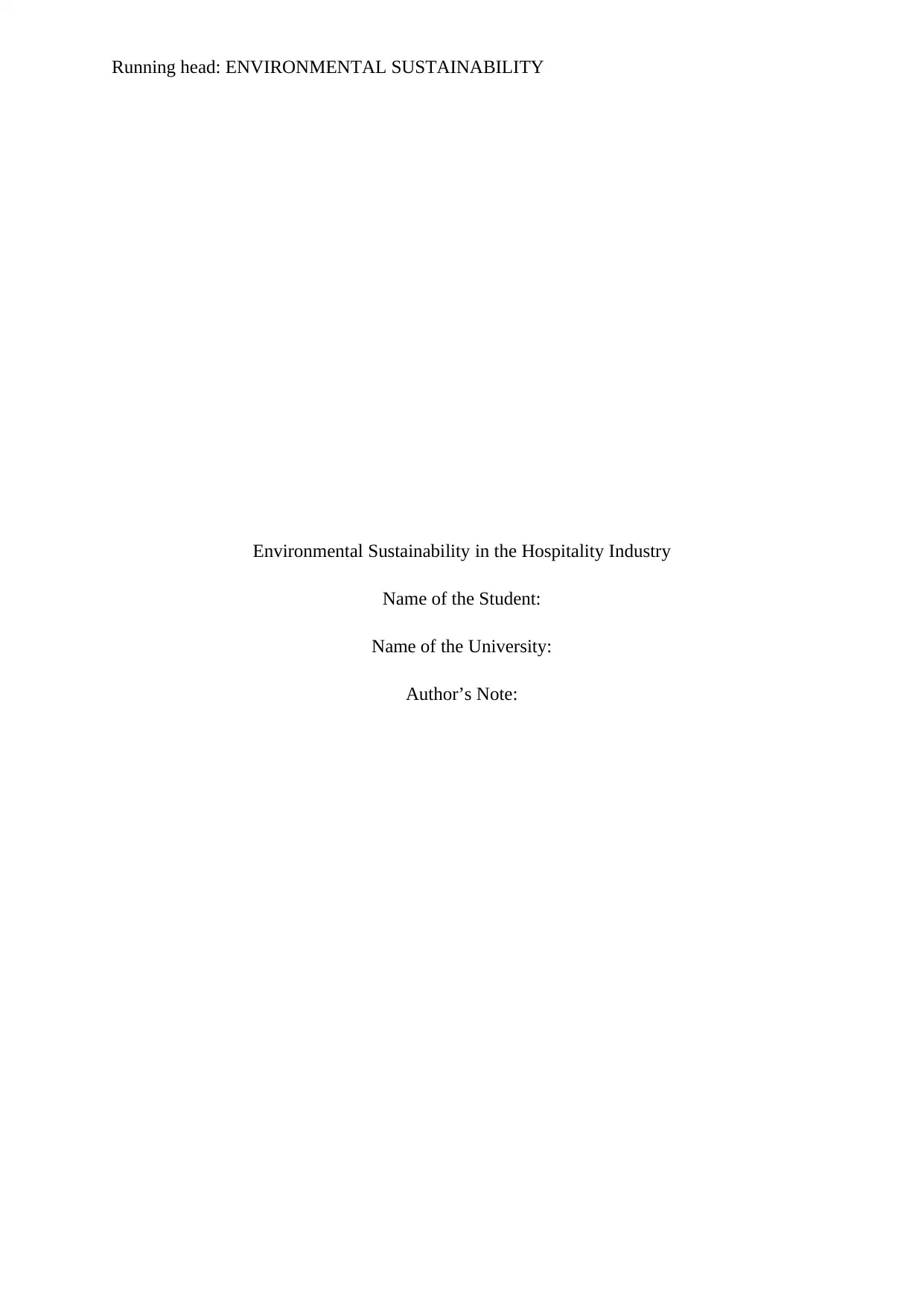
Running head: ENVIRONMENTAL SUSTAINABILITY
Environmental Sustainability in the Hospitality Industry
Name of the Student:
Name of the University:
Author’s Note:
Environmental Sustainability in the Hospitality Industry
Name of the Student:
Name of the University:
Author’s Note:
Secure Best Marks with AI Grader
Need help grading? Try our AI Grader for instant feedback on your assignments.
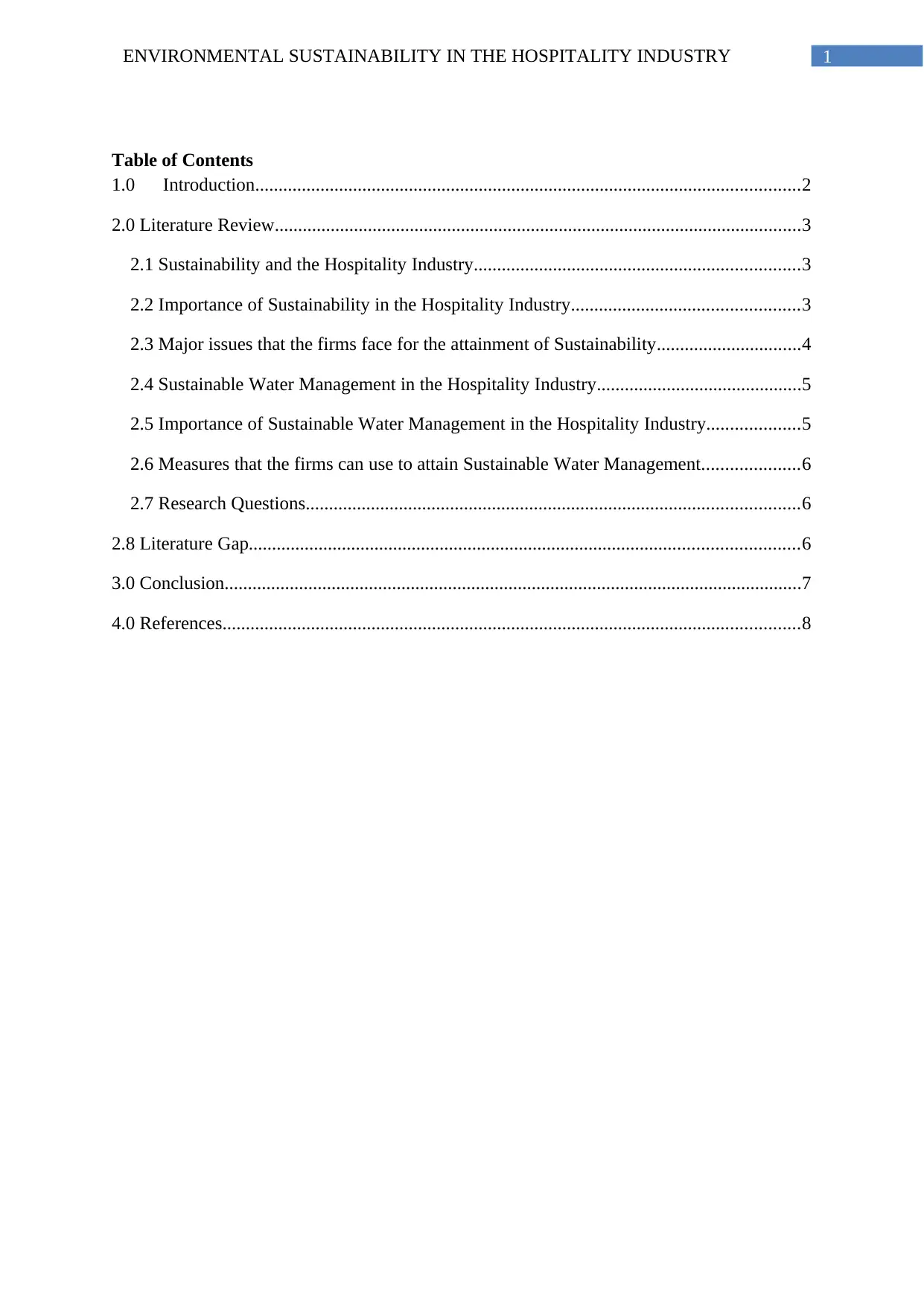
1ENVIRONMENTAL SUSTAINABILITY IN THE HOSPITALITY INDUSTRY
Table of Contents
1.0 Introduction.....................................................................................................................2
2.0 Literature Review.................................................................................................................3
2.1 Sustainability and the Hospitality Industry......................................................................3
2.2 Importance of Sustainability in the Hospitality Industry.................................................3
2.3 Major issues that the firms face for the attainment of Sustainability...............................4
2.4 Sustainable Water Management in the Hospitality Industry............................................5
2.5 Importance of Sustainable Water Management in the Hospitality Industry....................5
2.6 Measures that the firms can use to attain Sustainable Water Management.....................6
2.7 Research Questions..........................................................................................................6
2.8 Literature Gap......................................................................................................................6
3.0 Conclusion............................................................................................................................7
4.0 References............................................................................................................................8
Table of Contents
1.0 Introduction.....................................................................................................................2
2.0 Literature Review.................................................................................................................3
2.1 Sustainability and the Hospitality Industry......................................................................3
2.2 Importance of Sustainability in the Hospitality Industry.................................................3
2.3 Major issues that the firms face for the attainment of Sustainability...............................4
2.4 Sustainable Water Management in the Hospitality Industry............................................5
2.5 Importance of Sustainable Water Management in the Hospitality Industry....................5
2.6 Measures that the firms can use to attain Sustainable Water Management.....................6
2.7 Research Questions..........................................................................................................6
2.8 Literature Gap......................................................................................................................6
3.0 Conclusion............................................................................................................................7
4.0 References............................................................................................................................8
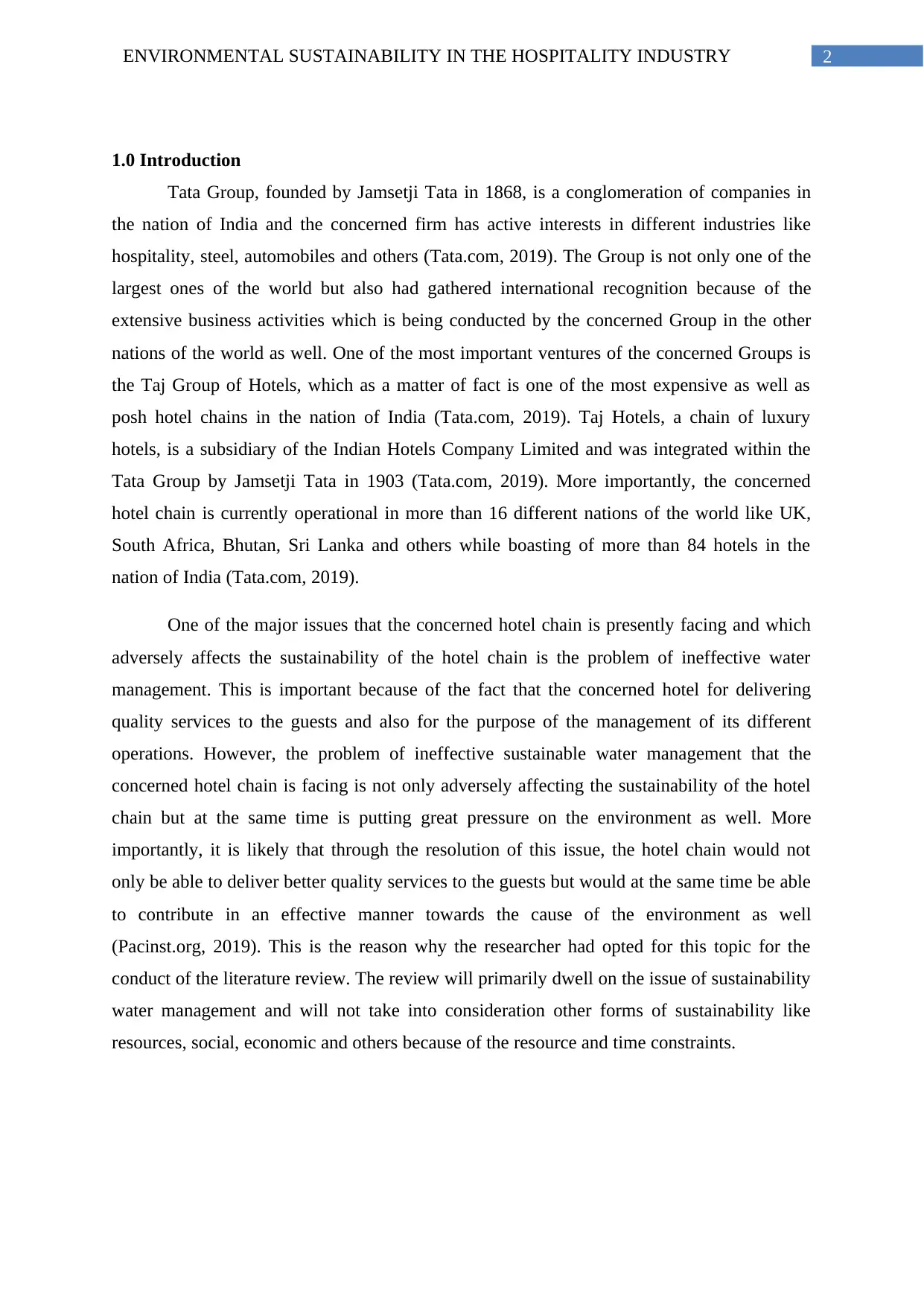
2ENVIRONMENTAL SUSTAINABILITY IN THE HOSPITALITY INDUSTRY
1.0 Introduction
Tata Group, founded by Jamsetji Tata in 1868, is a conglomeration of companies in
the nation of India and the concerned firm has active interests in different industries like
hospitality, steel, automobiles and others (Tata.com, 2019). The Group is not only one of the
largest ones of the world but also had gathered international recognition because of the
extensive business activities which is being conducted by the concerned Group in the other
nations of the world as well. One of the most important ventures of the concerned Groups is
the Taj Group of Hotels, which as a matter of fact is one of the most expensive as well as
posh hotel chains in the nation of India (Tata.com, 2019). Taj Hotels, a chain of luxury
hotels, is a subsidiary of the Indian Hotels Company Limited and was integrated within the
Tata Group by Jamsetji Tata in 1903 (Tata.com, 2019). More importantly, the concerned
hotel chain is currently operational in more than 16 different nations of the world like UK,
South Africa, Bhutan, Sri Lanka and others while boasting of more than 84 hotels in the
nation of India (Tata.com, 2019).
One of the major issues that the concerned hotel chain is presently facing and which
adversely affects the sustainability of the hotel chain is the problem of ineffective water
management. This is important because of the fact that the concerned hotel for delivering
quality services to the guests and also for the purpose of the management of its different
operations. However, the problem of ineffective sustainable water management that the
concerned hotel chain is facing is not only adversely affecting the sustainability of the hotel
chain but at the same time is putting great pressure on the environment as well. More
importantly, it is likely that through the resolution of this issue, the hotel chain would not
only be able to deliver better quality services to the guests but would at the same time be able
to contribute in an effective manner towards the cause of the environment as well
(Pacinst.org, 2019). This is the reason why the researcher had opted for this topic for the
conduct of the literature review. The review will primarily dwell on the issue of sustainability
water management and will not take into consideration other forms of sustainability like
resources, social, economic and others because of the resource and time constraints.
1.0 Introduction
Tata Group, founded by Jamsetji Tata in 1868, is a conglomeration of companies in
the nation of India and the concerned firm has active interests in different industries like
hospitality, steel, automobiles and others (Tata.com, 2019). The Group is not only one of the
largest ones of the world but also had gathered international recognition because of the
extensive business activities which is being conducted by the concerned Group in the other
nations of the world as well. One of the most important ventures of the concerned Groups is
the Taj Group of Hotels, which as a matter of fact is one of the most expensive as well as
posh hotel chains in the nation of India (Tata.com, 2019). Taj Hotels, a chain of luxury
hotels, is a subsidiary of the Indian Hotels Company Limited and was integrated within the
Tata Group by Jamsetji Tata in 1903 (Tata.com, 2019). More importantly, the concerned
hotel chain is currently operational in more than 16 different nations of the world like UK,
South Africa, Bhutan, Sri Lanka and others while boasting of more than 84 hotels in the
nation of India (Tata.com, 2019).
One of the major issues that the concerned hotel chain is presently facing and which
adversely affects the sustainability of the hotel chain is the problem of ineffective water
management. This is important because of the fact that the concerned hotel for delivering
quality services to the guests and also for the purpose of the management of its different
operations. However, the problem of ineffective sustainable water management that the
concerned hotel chain is facing is not only adversely affecting the sustainability of the hotel
chain but at the same time is putting great pressure on the environment as well. More
importantly, it is likely that through the resolution of this issue, the hotel chain would not
only be able to deliver better quality services to the guests but would at the same time be able
to contribute in an effective manner towards the cause of the environment as well
(Pacinst.org, 2019). This is the reason why the researcher had opted for this topic for the
conduct of the literature review. The review will primarily dwell on the issue of sustainability
water management and will not take into consideration other forms of sustainability like
resources, social, economic and others because of the resource and time constraints.
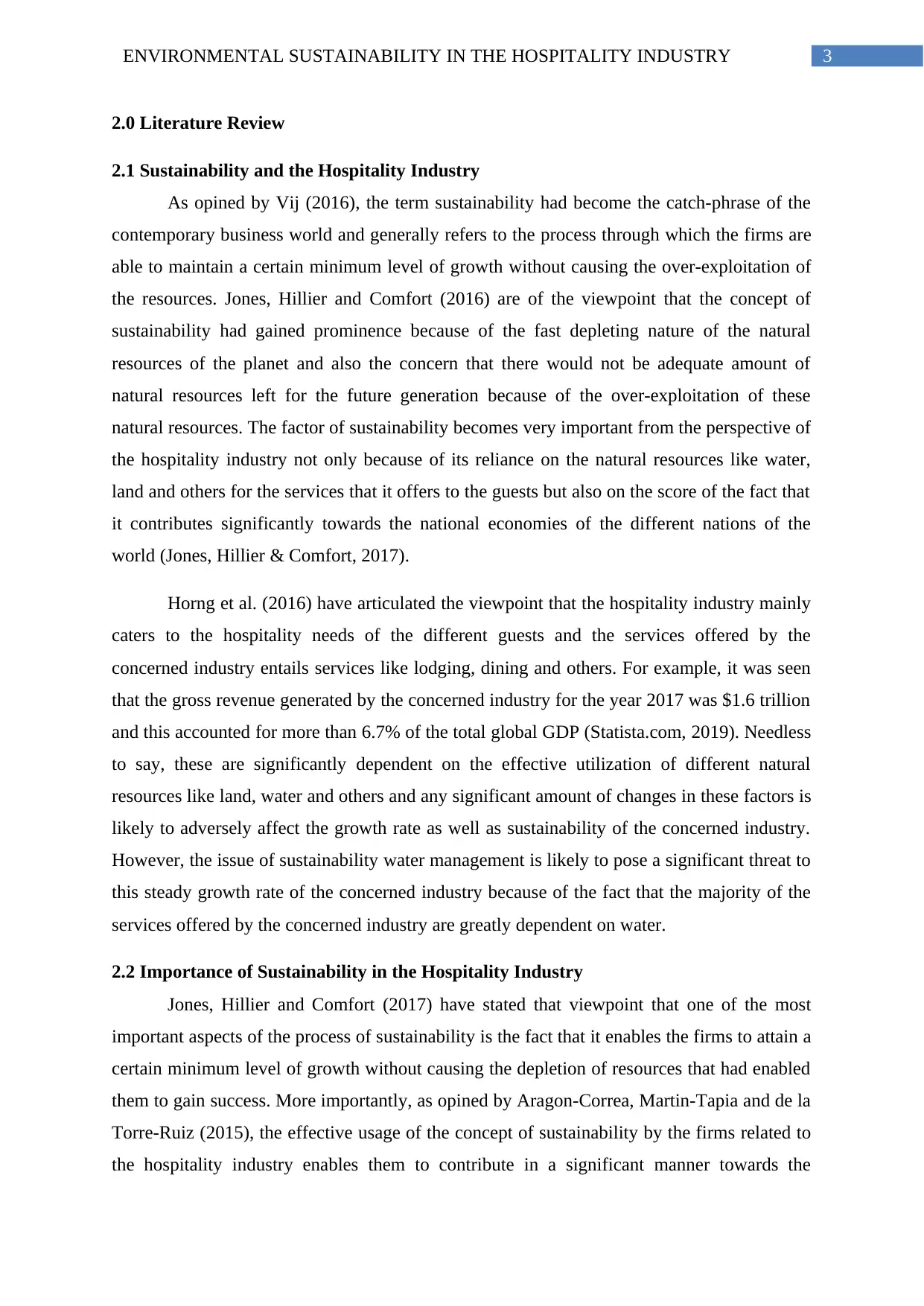
3ENVIRONMENTAL SUSTAINABILITY IN THE HOSPITALITY INDUSTRY
2.0 Literature Review
2.1 Sustainability and the Hospitality Industry
As opined by Vij (2016), the term sustainability had become the catch-phrase of the
contemporary business world and generally refers to the process through which the firms are
able to maintain a certain minimum level of growth without causing the over-exploitation of
the resources. Jones, Hillier and Comfort (2016) are of the viewpoint that the concept of
sustainability had gained prominence because of the fast depleting nature of the natural
resources of the planet and also the concern that there would not be adequate amount of
natural resources left for the future generation because of the over-exploitation of these
natural resources. The factor of sustainability becomes very important from the perspective of
the hospitality industry not only because of its reliance on the natural resources like water,
land and others for the services that it offers to the guests but also on the score of the fact that
it contributes significantly towards the national economies of the different nations of the
world (Jones, Hillier & Comfort, 2017).
Horng et al. (2016) have articulated the viewpoint that the hospitality industry mainly
caters to the hospitality needs of the different guests and the services offered by the
concerned industry entails services like lodging, dining and others. For example, it was seen
that the gross revenue generated by the concerned industry for the year 2017 was $1.6 trillion
and this accounted for more than 6.7% of the total global GDP (Statista.com, 2019). Needless
to say, these are significantly dependent on the effective utilization of different natural
resources like land, water and others and any significant amount of changes in these factors is
likely to adversely affect the growth rate as well as sustainability of the concerned industry.
However, the issue of sustainability water management is likely to pose a significant threat to
this steady growth rate of the concerned industry because of the fact that the majority of the
services offered by the concerned industry are greatly dependent on water.
2.2 Importance of Sustainability in the Hospitality Industry
Jones, Hillier and Comfort (2017) have stated that viewpoint that one of the most
important aspects of the process of sustainability is the fact that it enables the firms to attain a
certain minimum level of growth without causing the depletion of resources that had enabled
them to gain success. More importantly, as opined by Aragon-Correa, Martin-Tapia and de la
Torre-Ruiz (2015), the effective usage of the concept of sustainability by the firms related to
the hospitality industry enables them to contribute in a significant manner towards the
2.0 Literature Review
2.1 Sustainability and the Hospitality Industry
As opined by Vij (2016), the term sustainability had become the catch-phrase of the
contemporary business world and generally refers to the process through which the firms are
able to maintain a certain minimum level of growth without causing the over-exploitation of
the resources. Jones, Hillier and Comfort (2016) are of the viewpoint that the concept of
sustainability had gained prominence because of the fast depleting nature of the natural
resources of the planet and also the concern that there would not be adequate amount of
natural resources left for the future generation because of the over-exploitation of these
natural resources. The factor of sustainability becomes very important from the perspective of
the hospitality industry not only because of its reliance on the natural resources like water,
land and others for the services that it offers to the guests but also on the score of the fact that
it contributes significantly towards the national economies of the different nations of the
world (Jones, Hillier & Comfort, 2017).
Horng et al. (2016) have articulated the viewpoint that the hospitality industry mainly
caters to the hospitality needs of the different guests and the services offered by the
concerned industry entails services like lodging, dining and others. For example, it was seen
that the gross revenue generated by the concerned industry for the year 2017 was $1.6 trillion
and this accounted for more than 6.7% of the total global GDP (Statista.com, 2019). Needless
to say, these are significantly dependent on the effective utilization of different natural
resources like land, water and others and any significant amount of changes in these factors is
likely to adversely affect the growth rate as well as sustainability of the concerned industry.
However, the issue of sustainability water management is likely to pose a significant threat to
this steady growth rate of the concerned industry because of the fact that the majority of the
services offered by the concerned industry are greatly dependent on water.
2.2 Importance of Sustainability in the Hospitality Industry
Jones, Hillier and Comfort (2017) have stated that viewpoint that one of the most
important aspects of the process of sustainability is the fact that it enables the firms to attain a
certain minimum level of growth without causing the depletion of resources that had enabled
them to gain success. More importantly, as opined by Aragon-Correa, Martin-Tapia and de la
Torre-Ruiz (2015), the effective usage of the concept of sustainability by the firms related to
the hospitality industry enables them to contribute in a significant manner towards the
Secure Best Marks with AI Grader
Need help grading? Try our AI Grader for instant feedback on your assignments.
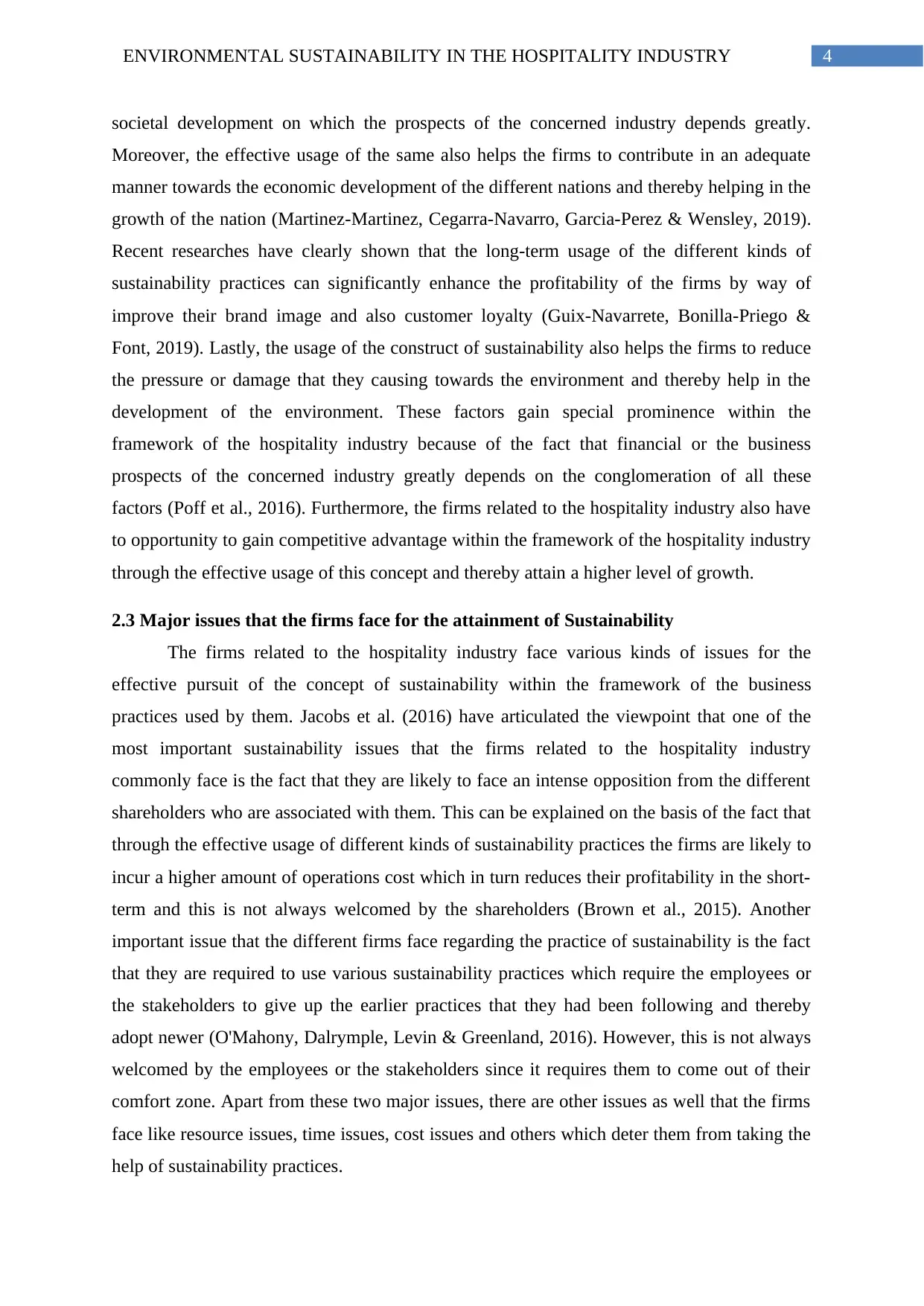
4ENVIRONMENTAL SUSTAINABILITY IN THE HOSPITALITY INDUSTRY
societal development on which the prospects of the concerned industry depends greatly.
Moreover, the effective usage of the same also helps the firms to contribute in an adequate
manner towards the economic development of the different nations and thereby helping in the
growth of the nation (Martinez-Martinez, Cegarra-Navarro, Garcia-Perez & Wensley, 2019).
Recent researches have clearly shown that the long-term usage of the different kinds of
sustainability practices can significantly enhance the profitability of the firms by way of
improve their brand image and also customer loyalty (Guix-Navarrete, Bonilla-Priego &
Font, 2019). Lastly, the usage of the construct of sustainability also helps the firms to reduce
the pressure or damage that they causing towards the environment and thereby help in the
development of the environment. These factors gain special prominence within the
framework of the hospitality industry because of the fact that financial or the business
prospects of the concerned industry greatly depends on the conglomeration of all these
factors (Poff et al., 2016). Furthermore, the firms related to the hospitality industry also have
to opportunity to gain competitive advantage within the framework of the hospitality industry
through the effective usage of this concept and thereby attain a higher level of growth.
2.3 Major issues that the firms face for the attainment of Sustainability
The firms related to the hospitality industry face various kinds of issues for the
effective pursuit of the concept of sustainability within the framework of the business
practices used by them. Jacobs et al. (2016) have articulated the viewpoint that one of the
most important sustainability issues that the firms related to the hospitality industry
commonly face is the fact that they are likely to face an intense opposition from the different
shareholders who are associated with them. This can be explained on the basis of the fact that
through the effective usage of different kinds of sustainability practices the firms are likely to
incur a higher amount of operations cost which in turn reduces their profitability in the short-
term and this is not always welcomed by the shareholders (Brown et al., 2015). Another
important issue that the different firms face regarding the practice of sustainability is the fact
that they are required to use various sustainability practices which require the employees or
the stakeholders to give up the earlier practices that they had been following and thereby
adopt newer (O'Mahony, Dalrymple, Levin & Greenland, 2016). However, this is not always
welcomed by the employees or the stakeholders since it requires them to come out of their
comfort zone. Apart from these two major issues, there are other issues as well that the firms
face like resource issues, time issues, cost issues and others which deter them from taking the
help of sustainability practices.
societal development on which the prospects of the concerned industry depends greatly.
Moreover, the effective usage of the same also helps the firms to contribute in an adequate
manner towards the economic development of the different nations and thereby helping in the
growth of the nation (Martinez-Martinez, Cegarra-Navarro, Garcia-Perez & Wensley, 2019).
Recent researches have clearly shown that the long-term usage of the different kinds of
sustainability practices can significantly enhance the profitability of the firms by way of
improve their brand image and also customer loyalty (Guix-Navarrete, Bonilla-Priego &
Font, 2019). Lastly, the usage of the construct of sustainability also helps the firms to reduce
the pressure or damage that they causing towards the environment and thereby help in the
development of the environment. These factors gain special prominence within the
framework of the hospitality industry because of the fact that financial or the business
prospects of the concerned industry greatly depends on the conglomeration of all these
factors (Poff et al., 2016). Furthermore, the firms related to the hospitality industry also have
to opportunity to gain competitive advantage within the framework of the hospitality industry
through the effective usage of this concept and thereby attain a higher level of growth.
2.3 Major issues that the firms face for the attainment of Sustainability
The firms related to the hospitality industry face various kinds of issues for the
effective pursuit of the concept of sustainability within the framework of the business
practices used by them. Jacobs et al. (2016) have articulated the viewpoint that one of the
most important sustainability issues that the firms related to the hospitality industry
commonly face is the fact that they are likely to face an intense opposition from the different
shareholders who are associated with them. This can be explained on the basis of the fact that
through the effective usage of different kinds of sustainability practices the firms are likely to
incur a higher amount of operations cost which in turn reduces their profitability in the short-
term and this is not always welcomed by the shareholders (Brown et al., 2015). Another
important issue that the different firms face regarding the practice of sustainability is the fact
that they are required to use various sustainability practices which require the employees or
the stakeholders to give up the earlier practices that they had been following and thereby
adopt newer (O'Mahony, Dalrymple, Levin & Greenland, 2016). However, this is not always
welcomed by the employees or the stakeholders since it requires them to come out of their
comfort zone. Apart from these two major issues, there are other issues as well that the firms
face like resource issues, time issues, cost issues and others which deter them from taking the
help of sustainability practices.
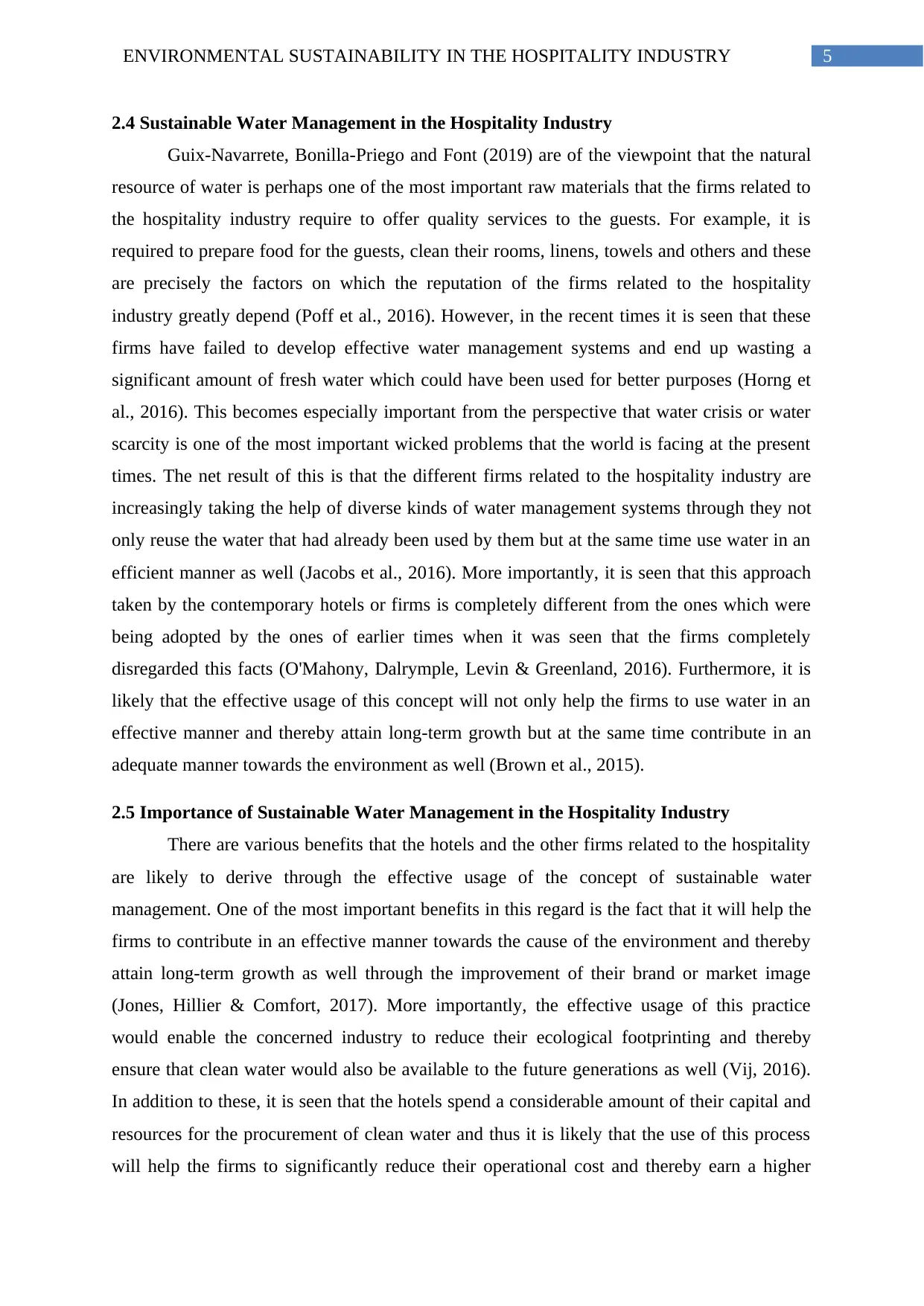
5ENVIRONMENTAL SUSTAINABILITY IN THE HOSPITALITY INDUSTRY
2.4 Sustainable Water Management in the Hospitality Industry
Guix-Navarrete, Bonilla-Priego and Font (2019) are of the viewpoint that the natural
resource of water is perhaps one of the most important raw materials that the firms related to
the hospitality industry require to offer quality services to the guests. For example, it is
required to prepare food for the guests, clean their rooms, linens, towels and others and these
are precisely the factors on which the reputation of the firms related to the hospitality
industry greatly depend (Poff et al., 2016). However, in the recent times it is seen that these
firms have failed to develop effective water management systems and end up wasting a
significant amount of fresh water which could have been used for better purposes (Horng et
al., 2016). This becomes especially important from the perspective that water crisis or water
scarcity is one of the most important wicked problems that the world is facing at the present
times. The net result of this is that the different firms related to the hospitality industry are
increasingly taking the help of diverse kinds of water management systems through they not
only reuse the water that had already been used by them but at the same time use water in an
efficient manner as well (Jacobs et al., 2016). More importantly, it is seen that this approach
taken by the contemporary hotels or firms is completely different from the ones which were
being adopted by the ones of earlier times when it was seen that the firms completely
disregarded this facts (O'Mahony, Dalrymple, Levin & Greenland, 2016). Furthermore, it is
likely that the effective usage of this concept will not only help the firms to use water in an
effective manner and thereby attain long-term growth but at the same time contribute in an
adequate manner towards the environment as well (Brown et al., 2015).
2.5 Importance of Sustainable Water Management in the Hospitality Industry
There are various benefits that the hotels and the other firms related to the hospitality
are likely to derive through the effective usage of the concept of sustainable water
management. One of the most important benefits in this regard is the fact that it will help the
firms to contribute in an effective manner towards the cause of the environment and thereby
attain long-term growth as well through the improvement of their brand or market image
(Jones, Hillier & Comfort, 2017). More importantly, the effective usage of this practice
would enable the concerned industry to reduce their ecological footprinting and thereby
ensure that clean water would also be available to the future generations as well (Vij, 2016).
In addition to these, it is seen that the hotels spend a considerable amount of their capital and
resources for the procurement of clean water and thus it is likely that the use of this process
will help the firms to significantly reduce their operational cost and thereby earn a higher
2.4 Sustainable Water Management in the Hospitality Industry
Guix-Navarrete, Bonilla-Priego and Font (2019) are of the viewpoint that the natural
resource of water is perhaps one of the most important raw materials that the firms related to
the hospitality industry require to offer quality services to the guests. For example, it is
required to prepare food for the guests, clean their rooms, linens, towels and others and these
are precisely the factors on which the reputation of the firms related to the hospitality
industry greatly depend (Poff et al., 2016). However, in the recent times it is seen that these
firms have failed to develop effective water management systems and end up wasting a
significant amount of fresh water which could have been used for better purposes (Horng et
al., 2016). This becomes especially important from the perspective that water crisis or water
scarcity is one of the most important wicked problems that the world is facing at the present
times. The net result of this is that the different firms related to the hospitality industry are
increasingly taking the help of diverse kinds of water management systems through they not
only reuse the water that had already been used by them but at the same time use water in an
efficient manner as well (Jacobs et al., 2016). More importantly, it is seen that this approach
taken by the contemporary hotels or firms is completely different from the ones which were
being adopted by the ones of earlier times when it was seen that the firms completely
disregarded this facts (O'Mahony, Dalrymple, Levin & Greenland, 2016). Furthermore, it is
likely that the effective usage of this concept will not only help the firms to use water in an
effective manner and thereby attain long-term growth but at the same time contribute in an
adequate manner towards the environment as well (Brown et al., 2015).
2.5 Importance of Sustainable Water Management in the Hospitality Industry
There are various benefits that the hotels and the other firms related to the hospitality
are likely to derive through the effective usage of the concept of sustainable water
management. One of the most important benefits in this regard is the fact that it will help the
firms to contribute in an effective manner towards the cause of the environment and thereby
attain long-term growth as well through the improvement of their brand or market image
(Jones, Hillier & Comfort, 2017). More importantly, the effective usage of this practice
would enable the concerned industry to reduce their ecological footprinting and thereby
ensure that clean water would also be available to the future generations as well (Vij, 2016).
In addition to these, it is seen that the hotels spend a considerable amount of their capital and
resources for the procurement of clean water and thus it is likely that the use of this process
will help the firms to significantly reduce their operational cost and thereby earn a higher
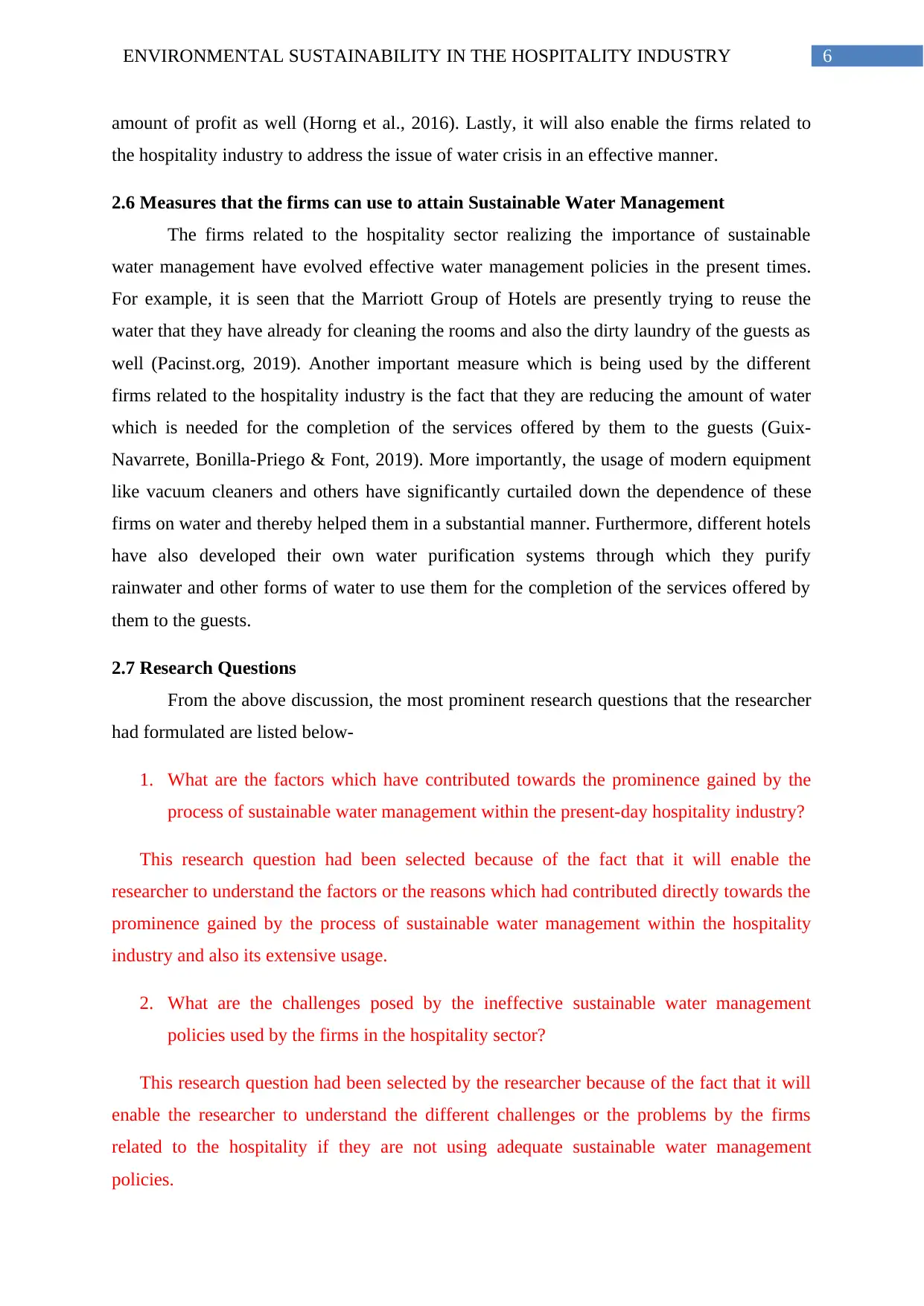
6ENVIRONMENTAL SUSTAINABILITY IN THE HOSPITALITY INDUSTRY
amount of profit as well (Horng et al., 2016). Lastly, it will also enable the firms related to
the hospitality industry to address the issue of water crisis in an effective manner.
2.6 Measures that the firms can use to attain Sustainable Water Management
The firms related to the hospitality sector realizing the importance of sustainable
water management have evolved effective water management policies in the present times.
For example, it is seen that the Marriott Group of Hotels are presently trying to reuse the
water that they have already for cleaning the rooms and also the dirty laundry of the guests as
well (Pacinst.org, 2019). Another important measure which is being used by the different
firms related to the hospitality industry is the fact that they are reducing the amount of water
which is needed for the completion of the services offered by them to the guests (Guix-
Navarrete, Bonilla-Priego & Font, 2019). More importantly, the usage of modern equipment
like vacuum cleaners and others have significantly curtailed down the dependence of these
firms on water and thereby helped them in a substantial manner. Furthermore, different hotels
have also developed their own water purification systems through which they purify
rainwater and other forms of water to use them for the completion of the services offered by
them to the guests.
2.7 Research Questions
From the above discussion, the most prominent research questions that the researcher
had formulated are listed below-
1. What are the factors which have contributed towards the prominence gained by the
process of sustainable water management within the present-day hospitality industry?
This research question had been selected because of the fact that it will enable the
researcher to understand the factors or the reasons which had contributed directly towards the
prominence gained by the process of sustainable water management within the hospitality
industry and also its extensive usage.
2. What are the challenges posed by the ineffective sustainable water management
policies used by the firms in the hospitality sector?
This research question had been selected by the researcher because of the fact that it will
enable the researcher to understand the different challenges or the problems by the firms
related to the hospitality if they are not using adequate sustainable water management
policies.
amount of profit as well (Horng et al., 2016). Lastly, it will also enable the firms related to
the hospitality industry to address the issue of water crisis in an effective manner.
2.6 Measures that the firms can use to attain Sustainable Water Management
The firms related to the hospitality sector realizing the importance of sustainable
water management have evolved effective water management policies in the present times.
For example, it is seen that the Marriott Group of Hotels are presently trying to reuse the
water that they have already for cleaning the rooms and also the dirty laundry of the guests as
well (Pacinst.org, 2019). Another important measure which is being used by the different
firms related to the hospitality industry is the fact that they are reducing the amount of water
which is needed for the completion of the services offered by them to the guests (Guix-
Navarrete, Bonilla-Priego & Font, 2019). More importantly, the usage of modern equipment
like vacuum cleaners and others have significantly curtailed down the dependence of these
firms on water and thereby helped them in a substantial manner. Furthermore, different hotels
have also developed their own water purification systems through which they purify
rainwater and other forms of water to use them for the completion of the services offered by
them to the guests.
2.7 Research Questions
From the above discussion, the most prominent research questions that the researcher
had formulated are listed below-
1. What are the factors which have contributed towards the prominence gained by the
process of sustainable water management within the present-day hospitality industry?
This research question had been selected because of the fact that it will enable the
researcher to understand the factors or the reasons which had contributed directly towards the
prominence gained by the process of sustainable water management within the hospitality
industry and also its extensive usage.
2. What are the challenges posed by the ineffective sustainable water management
policies used by the firms in the hospitality sector?
This research question had been selected by the researcher because of the fact that it will
enable the researcher to understand the different challenges or the problems by the firms
related to the hospitality if they are not using adequate sustainable water management
policies.
Paraphrase This Document
Need a fresh take? Get an instant paraphrase of this document with our AI Paraphraser
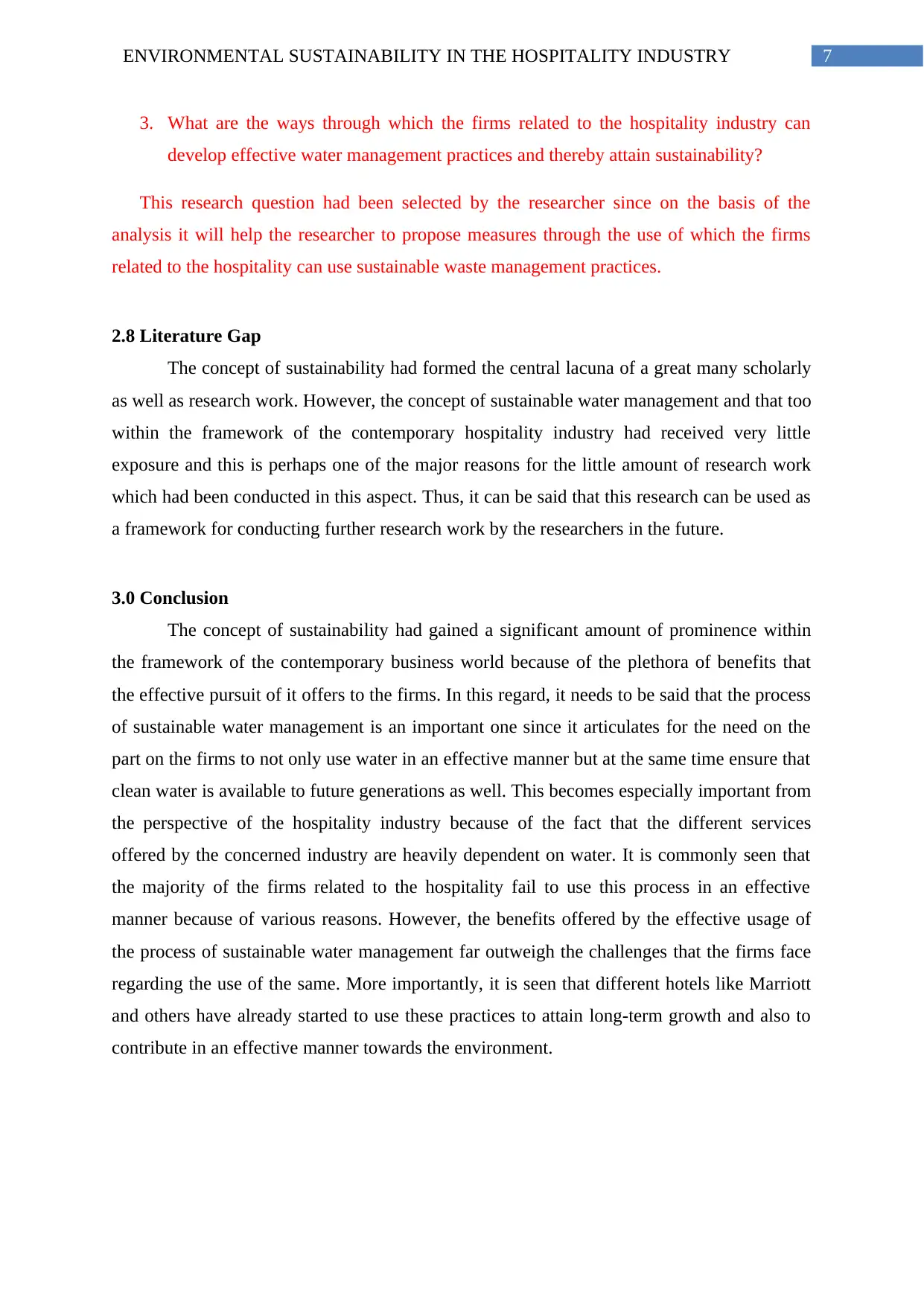
7ENVIRONMENTAL SUSTAINABILITY IN THE HOSPITALITY INDUSTRY
3. What are the ways through which the firms related to the hospitality industry can
develop effective water management practices and thereby attain sustainability?
This research question had been selected by the researcher since on the basis of the
analysis it will help the researcher to propose measures through the use of which the firms
related to the hospitality can use sustainable waste management practices.
2.8 Literature Gap
The concept of sustainability had formed the central lacuna of a great many scholarly
as well as research work. However, the concept of sustainable water management and that too
within the framework of the contemporary hospitality industry had received very little
exposure and this is perhaps one of the major reasons for the little amount of research work
which had been conducted in this aspect. Thus, it can be said that this research can be used as
a framework for conducting further research work by the researchers in the future.
3.0 Conclusion
The concept of sustainability had gained a significant amount of prominence within
the framework of the contemporary business world because of the plethora of benefits that
the effective pursuit of it offers to the firms. In this regard, it needs to be said that the process
of sustainable water management is an important one since it articulates for the need on the
part on the firms to not only use water in an effective manner but at the same time ensure that
clean water is available to future generations as well. This becomes especially important from
the perspective of the hospitality industry because of the fact that the different services
offered by the concerned industry are heavily dependent on water. It is commonly seen that
the majority of the firms related to the hospitality fail to use this process in an effective
manner because of various reasons. However, the benefits offered by the effective usage of
the process of sustainable water management far outweigh the challenges that the firms face
regarding the use of the same. More importantly, it is seen that different hotels like Marriott
and others have already started to use these practices to attain long-term growth and also to
contribute in an effective manner towards the environment.
3. What are the ways through which the firms related to the hospitality industry can
develop effective water management practices and thereby attain sustainability?
This research question had been selected by the researcher since on the basis of the
analysis it will help the researcher to propose measures through the use of which the firms
related to the hospitality can use sustainable waste management practices.
2.8 Literature Gap
The concept of sustainability had formed the central lacuna of a great many scholarly
as well as research work. However, the concept of sustainable water management and that too
within the framework of the contemporary hospitality industry had received very little
exposure and this is perhaps one of the major reasons for the little amount of research work
which had been conducted in this aspect. Thus, it can be said that this research can be used as
a framework for conducting further research work by the researchers in the future.
3.0 Conclusion
The concept of sustainability had gained a significant amount of prominence within
the framework of the contemporary business world because of the plethora of benefits that
the effective pursuit of it offers to the firms. In this regard, it needs to be said that the process
of sustainable water management is an important one since it articulates for the need on the
part on the firms to not only use water in an effective manner but at the same time ensure that
clean water is available to future generations as well. This becomes especially important from
the perspective of the hospitality industry because of the fact that the different services
offered by the concerned industry are heavily dependent on water. It is commonly seen that
the majority of the firms related to the hospitality fail to use this process in an effective
manner because of various reasons. However, the benefits offered by the effective usage of
the process of sustainable water management far outweigh the challenges that the firms face
regarding the use of the same. More importantly, it is seen that different hotels like Marriott
and others have already started to use these practices to attain long-term growth and also to
contribute in an effective manner towards the environment.
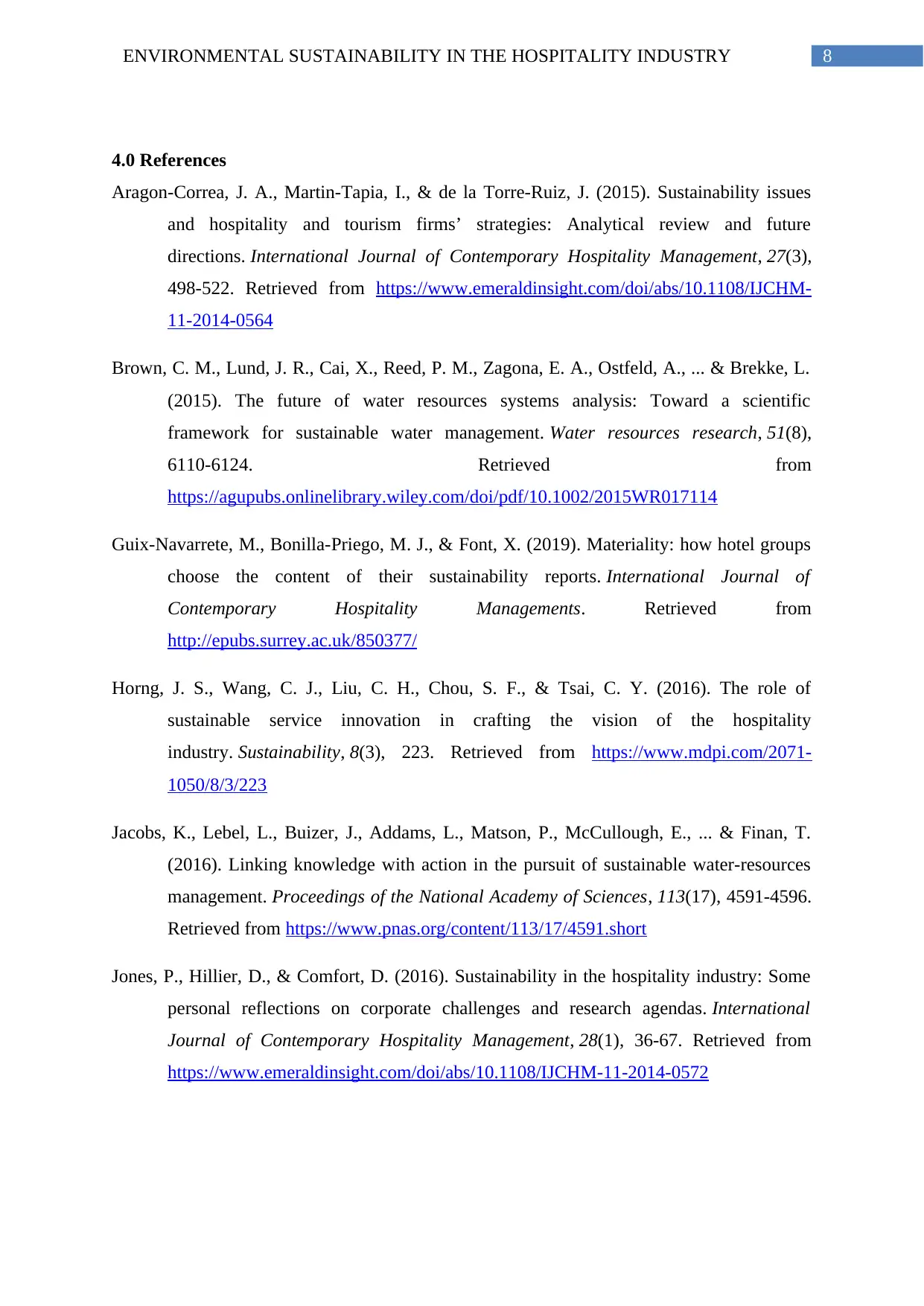
8ENVIRONMENTAL SUSTAINABILITY IN THE HOSPITALITY INDUSTRY
4.0 References
Aragon-Correa, J. A., Martin-Tapia, I., & de la Torre-Ruiz, J. (2015). Sustainability issues
and hospitality and tourism firms’ strategies: Analytical review and future
directions. International Journal of Contemporary Hospitality Management, 27(3),
498-522. Retrieved from https://www.emeraldinsight.com/doi/abs/10.1108/IJCHM-
11-2014-0564
Brown, C. M., Lund, J. R., Cai, X., Reed, P. M., Zagona, E. A., Ostfeld, A., ... & Brekke, L.
(2015). The future of water resources systems analysis: Toward a scientific
framework for sustainable water management. Water resources research, 51(8),
6110-6124. Retrieved from
https://agupubs.onlinelibrary.wiley.com/doi/pdf/10.1002/2015WR017114
Guix-Navarrete, M., Bonilla-Priego, M. J., & Font, X. (2019). Materiality: how hotel groups
choose the content of their sustainability reports. International Journal of
Contemporary Hospitality Managements. Retrieved from
http://epubs.surrey.ac.uk/850377/
Horng, J. S., Wang, C. J., Liu, C. H., Chou, S. F., & Tsai, C. Y. (2016). The role of
sustainable service innovation in crafting the vision of the hospitality
industry. Sustainability, 8(3), 223. Retrieved from https://www.mdpi.com/2071-
1050/8/3/223
Jacobs, K., Lebel, L., Buizer, J., Addams, L., Matson, P., McCullough, E., ... & Finan, T.
(2016). Linking knowledge with action in the pursuit of sustainable water-resources
management. Proceedings of the National Academy of Sciences, 113(17), 4591-4596.
Retrieved from https://www.pnas.org/content/113/17/4591.short
Jones, P., Hillier, D., & Comfort, D. (2016). Sustainability in the hospitality industry: Some
personal reflections on corporate challenges and research agendas. International
Journal of Contemporary Hospitality Management, 28(1), 36-67. Retrieved from
https://www.emeraldinsight.com/doi/abs/10.1108/IJCHM-11-2014-0572
4.0 References
Aragon-Correa, J. A., Martin-Tapia, I., & de la Torre-Ruiz, J. (2015). Sustainability issues
and hospitality and tourism firms’ strategies: Analytical review and future
directions. International Journal of Contemporary Hospitality Management, 27(3),
498-522. Retrieved from https://www.emeraldinsight.com/doi/abs/10.1108/IJCHM-
11-2014-0564
Brown, C. M., Lund, J. R., Cai, X., Reed, P. M., Zagona, E. A., Ostfeld, A., ... & Brekke, L.
(2015). The future of water resources systems analysis: Toward a scientific
framework for sustainable water management. Water resources research, 51(8),
6110-6124. Retrieved from
https://agupubs.onlinelibrary.wiley.com/doi/pdf/10.1002/2015WR017114
Guix-Navarrete, M., Bonilla-Priego, M. J., & Font, X. (2019). Materiality: how hotel groups
choose the content of their sustainability reports. International Journal of
Contemporary Hospitality Managements. Retrieved from
http://epubs.surrey.ac.uk/850377/
Horng, J. S., Wang, C. J., Liu, C. H., Chou, S. F., & Tsai, C. Y. (2016). The role of
sustainable service innovation in crafting the vision of the hospitality
industry. Sustainability, 8(3), 223. Retrieved from https://www.mdpi.com/2071-
1050/8/3/223
Jacobs, K., Lebel, L., Buizer, J., Addams, L., Matson, P., McCullough, E., ... & Finan, T.
(2016). Linking knowledge with action in the pursuit of sustainable water-resources
management. Proceedings of the National Academy of Sciences, 113(17), 4591-4596.
Retrieved from https://www.pnas.org/content/113/17/4591.short
Jones, P., Hillier, D., & Comfort, D. (2016). Sustainability in the hospitality industry: Some
personal reflections on corporate challenges and research agendas. International
Journal of Contemporary Hospitality Management, 28(1), 36-67. Retrieved from
https://www.emeraldinsight.com/doi/abs/10.1108/IJCHM-11-2014-0572
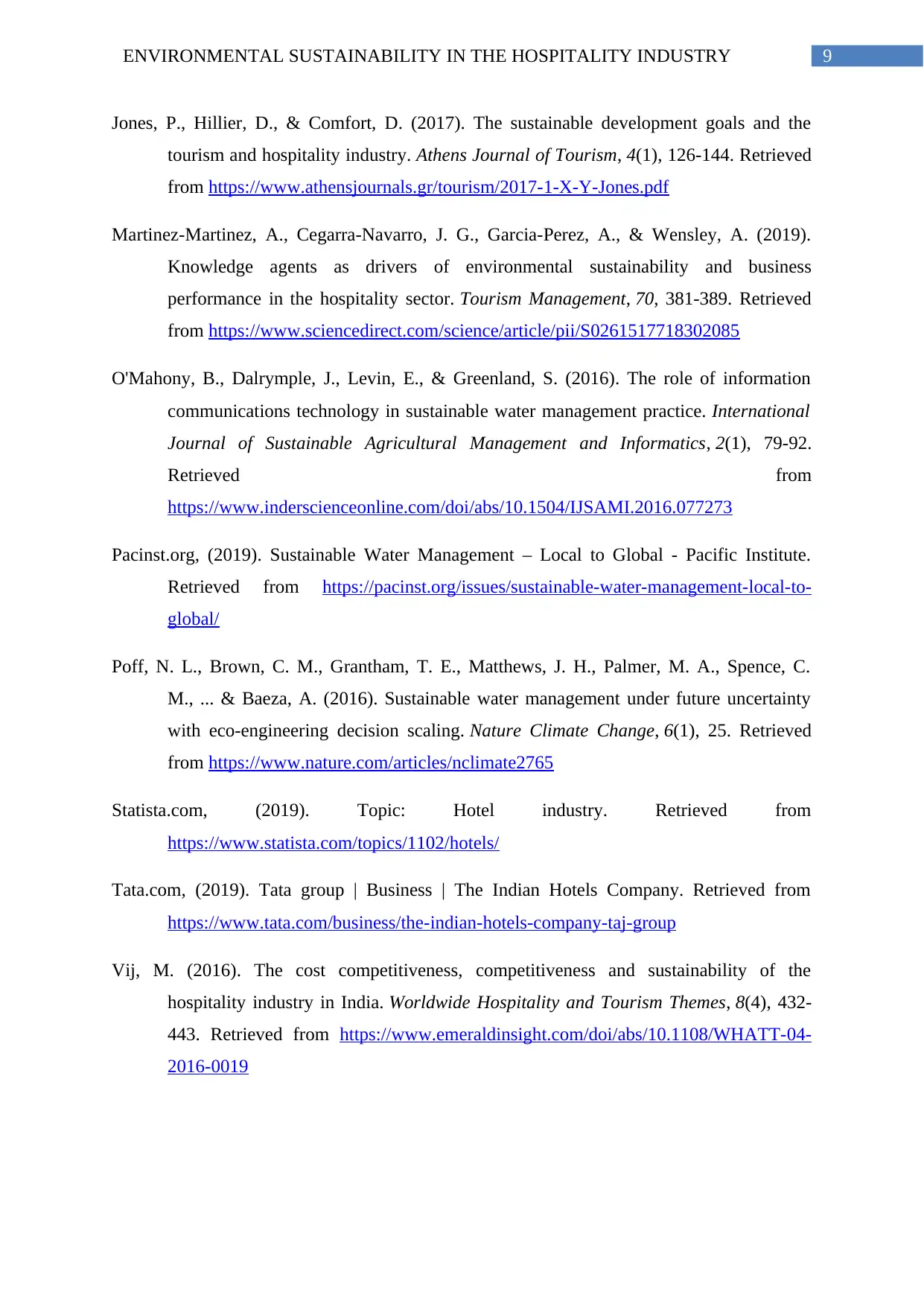
9ENVIRONMENTAL SUSTAINABILITY IN THE HOSPITALITY INDUSTRY
Jones, P., Hillier, D., & Comfort, D. (2017). The sustainable development goals and the
tourism and hospitality industry. Athens Journal of Tourism, 4(1), 126-144. Retrieved
from https://www.athensjournals.gr/tourism/2017-1-X-Y-Jones.pdf
Martinez-Martinez, A., Cegarra-Navarro, J. G., Garcia-Perez, A., & Wensley, A. (2019).
Knowledge agents as drivers of environmental sustainability and business
performance in the hospitality sector. Tourism Management, 70, 381-389. Retrieved
from https://www.sciencedirect.com/science/article/pii/S0261517718302085
O'Mahony, B., Dalrymple, J., Levin, E., & Greenland, S. (2016). The role of information
communications technology in sustainable water management practice. International
Journal of Sustainable Agricultural Management and Informatics, 2(1), 79-92.
Retrieved from
https://www.inderscienceonline.com/doi/abs/10.1504/IJSAMI.2016.077273
Pacinst.org, (2019). Sustainable Water Management – Local to Global - Pacific Institute.
Retrieved from https://pacinst.org/issues/sustainable-water-management-local-to-
global/
Poff, N. L., Brown, C. M., Grantham, T. E., Matthews, J. H., Palmer, M. A., Spence, C.
M., ... & Baeza, A. (2016). Sustainable water management under future uncertainty
with eco-engineering decision scaling. Nature Climate Change, 6(1), 25. Retrieved
from https://www.nature.com/articles/nclimate2765
Statista.com, (2019). Topic: Hotel industry. Retrieved from
https://www.statista.com/topics/1102/hotels/
Tata.com, (2019). Tata group | Business | The Indian Hotels Company. Retrieved from
https://www.tata.com/business/the-indian-hotels-company-taj-group
Vij, M. (2016). The cost competitiveness, competitiveness and sustainability of the
hospitality industry in India. Worldwide Hospitality and Tourism Themes, 8(4), 432-
443. Retrieved from https://www.emeraldinsight.com/doi/abs/10.1108/WHATT-04-
2016-0019
Jones, P., Hillier, D., & Comfort, D. (2017). The sustainable development goals and the
tourism and hospitality industry. Athens Journal of Tourism, 4(1), 126-144. Retrieved
from https://www.athensjournals.gr/tourism/2017-1-X-Y-Jones.pdf
Martinez-Martinez, A., Cegarra-Navarro, J. G., Garcia-Perez, A., & Wensley, A. (2019).
Knowledge agents as drivers of environmental sustainability and business
performance in the hospitality sector. Tourism Management, 70, 381-389. Retrieved
from https://www.sciencedirect.com/science/article/pii/S0261517718302085
O'Mahony, B., Dalrymple, J., Levin, E., & Greenland, S. (2016). The role of information
communications technology in sustainable water management practice. International
Journal of Sustainable Agricultural Management and Informatics, 2(1), 79-92.
Retrieved from
https://www.inderscienceonline.com/doi/abs/10.1504/IJSAMI.2016.077273
Pacinst.org, (2019). Sustainable Water Management – Local to Global - Pacific Institute.
Retrieved from https://pacinst.org/issues/sustainable-water-management-local-to-
global/
Poff, N. L., Brown, C. M., Grantham, T. E., Matthews, J. H., Palmer, M. A., Spence, C.
M., ... & Baeza, A. (2016). Sustainable water management under future uncertainty
with eco-engineering decision scaling. Nature Climate Change, 6(1), 25. Retrieved
from https://www.nature.com/articles/nclimate2765
Statista.com, (2019). Topic: Hotel industry. Retrieved from
https://www.statista.com/topics/1102/hotels/
Tata.com, (2019). Tata group | Business | The Indian Hotels Company. Retrieved from
https://www.tata.com/business/the-indian-hotels-company-taj-group
Vij, M. (2016). The cost competitiveness, competitiveness and sustainability of the
hospitality industry in India. Worldwide Hospitality and Tourism Themes, 8(4), 432-
443. Retrieved from https://www.emeraldinsight.com/doi/abs/10.1108/WHATT-04-
2016-0019
1 out of 10
Related Documents
Your All-in-One AI-Powered Toolkit for Academic Success.
+13062052269
info@desklib.com
Available 24*7 on WhatsApp / Email
![[object Object]](/_next/static/media/star-bottom.7253800d.svg)
Unlock your academic potential
© 2024 | Zucol Services PVT LTD | All rights reserved.





